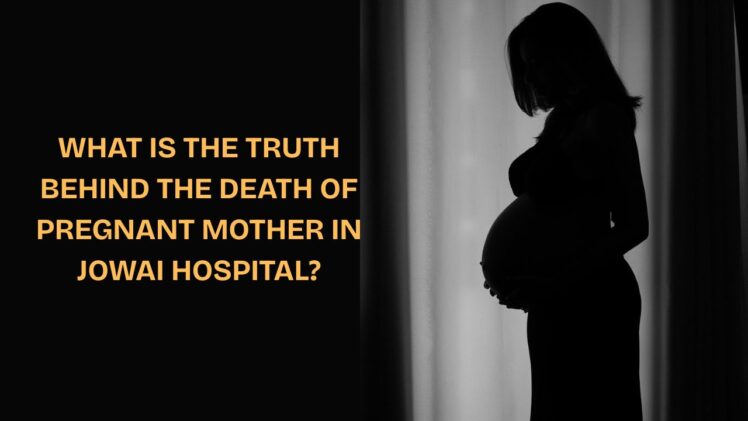
A tragic incident involving the death of 37-year-old Pynche Bareh, a mother of seven from Jalaphet, Sutnga in West Jaintia Hills, has triggered a wave of public outcry and accusations of gross medical negligence at the MCH Hospital in Jowai. The incident has renewed concerns over the state of rural healthcare in Meghalaya, particularly for expectant mothers in under-resourced districts.
According to the family, Bareh, who was pregnant with her eighth child, was initially taken to the Community Health Centre (CHC) in Sutnga after experiencing vaginal bleeding. Doctors at the CHC, upon evaluating the seriousness of the case, referred her to MCH Hospital in Jowai. However, due to her fear of undergoing a caesarean section (CS), having delivered all previous children naturally, she and her family delayed the transfer, hoping for a natural birth.
When her condition worsened, Bareh agreed to the referral and was transported to MCH Jowai by ambulance. Upon arrival, the family alleges that hospital staff scolded them for the delay and did not treat the case as an emergency. The patient was reportedly told to fast overnight in preparation for surgery the next morning.
Family members say that despite repeated pleas to hospital staff to attend to her worsening condition, Bareh remained unattended for hours. “She was hungry, scared, and in pain. My mother kept asking the nurses when the surgery would be done, but they kept dismissing her,” said Wenty Bareh, the deceased’s sister.
By the early hours of the following morning, Pynche Bareh’s condition had deteriorated significantly. An attendant accompanying her allegedly had to carry her to the labour room without any help from the hospital staff. Despite obvious signs of distress, the family claims she was told to deliver naturally, with staff reportedly saying, “She has already birthed seven babies. She should be able to do it.”
Tragically, Pynche Bareh passed away on June 4. The family alleges her uterus had ruptured, a condition known medically as uterine rupture, often fatal without immediate surgical intervention. Her baby did not survive either and passed while still in her womb.
“They only brought oxygen after her uterus had already burst,” said one of the sisters. “We kept asking for help, asking them to check her. They ignored us until it was too late.”
Hospital’s Response
In response to the allegations, the hospital administration cited understaffing and a shortage of surgeons and other necessary resources. In a press briefing, Dr. NE Kharshohnoh, Director of Health Services (MCH & FW), stated that the patient was under monitoring upon arrival and that the family had requested a transfer to another hospital at 7:15 p.m. While processing the discharge, Bareh’s condition deteriorated rapidly, making the transfer impossible.
Dr. W. Shangpliang, who reviewed the medical records, confirmed that the cause of death was uterine rupture, which occurred after the baby had already died in utero.
Dr. L. Mylliemumlong, a senior health official, added that multiple pregnancies weaken the uterus over time, making rupture more likely. However, she said that further investigation is necessary to determine the exact sequence of events and any possible negligence.
ALSO WATCH:
Family Seeks Justice
The family of the deceased and the Bareh Clan as a whole, supported by the Jaintia Students’ Union (JSU), has filed an FIR and demanded a full inquiry into the incident. They have accused the hospital staff of negligence, unprofessional behaviour, and delay in providing urgent medical care that could have saved both mother and child.
“We’re not looking to ruin anyone’s future,” said one family member. “But this negligence must be accounted for. My sister is gone, and now her seven children are left without a mother.”
Discipline Bareh, another sister of the deceased, said no tests were conducted initially and the medical team relied only on physical examination. “Even when we informed them about her condition worsening, they kept delaying. If only someone had taken her condition seriously earlier, she might still be with us today.”
JSU and Public Reaction
JSU General Secretary, Neilkeer Mukhim voiced support for the family, blaming the government for failing to equip rural health centers with the necessary infrastructure and personnel. “You cannot blame the staff completely when the hospital has only one surgeon. The government has failed the people,” he said. He added that the MCH Hospital in Jowai has been underperforming for years due to chronic understaffing. “If the government cannot manage the hospital properly, they should shut it down. What’s the use of a hospital if people go there and die due to neglect?”
As the Deputy Commissioner begins an inquiry, the family and the JSU are demanding not just accountability but systemic reform. They have also appealed for financial and educational support for the seven orphaned children left behind.
The incident has reignited public debate around maternal healthcare, especially in rural Meghalaya, and highlighted the urgent need for better hospital management, timely emergency care, and compassionate patient handling.
The Doctors and Staffs reiterated that the healthcare in the state is committed to serving the people, especially those who can’t afford expensive healthcare and they have no intention of doing harm to the lives of the patients. As the investigation unfolds, the family hopes their loss will serve as a wake-up call to prevent such tragedies in the future.
(Edited by Ibalarishisha Syiem)






